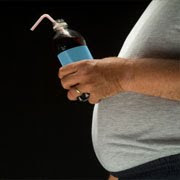
For a long time, there was no question regarding the cause of obesity. It was accepted that people who did not watch what they eat and never got physical exercise were putting themselves at great risk for becoming overweight or obese. And then medical science stepped in, evaluated the various cause of obesity, and found that some people may be genetically disposed to becoming overweight or obese.
So what is the real answer? Is obesity brought on by genetics or what the individual eats and how much exercise he or she gets?
Nature
Much ado has been made recently over the finding of what has been politically incorrectly named the "Fat Gene." Supposed to indicate an individual's likelihood to wind up obese, the fat gene is at once a major scientific breakthrough and the cause of heartbreak for everyone found to have inherited this seeming inescapable fate of obesity.
However, this new finding isn't the only known reason for an individual becoming obese. There are a handful of other conditions that normally lead to an individual gaining weight, often to the point of obesity. One of the most common is hypothyroidism. When the thyroid gland in your neck isn't working properly, your body doesn't make enough of a chemical that helps control the amount of energy it uses. As a result, you don't burn enough calories to maintain a healthy weight, making it easy to become overweight or obese.
Nurture
According to the U.S. Centers for Disease Control and Prevention, obesity comes down to a simple formula: bringing more energy into your body than you're burning off over a long period of time. So when you eat more calories than you burn off during the course of a single day, you may not wind up gaining weight. But do this day after day, month after month, year after year, and you will be on the path to weight gain and potentially obesity. Work hard to burn more calories than you eat, and you should be able to maintain a healthy weight.
Regardless of any conditions that may make someone predisposed to weight gain, with enough work, many are able to maintain control of their weight. In fact, research has found that even individuals with the fat gene are given the upper hand against obesity if they're willing to spend 60 minutes a day exercising, and medication for hypothyroidism helps improve the condition and make exercise more effective.
Together at Last
Though nature and nurture put an individual at risk for becoming obese, the combination is a guaranteed recipe for obesity. So if you find yourself living with a condition that puts you at risk for obesity, the fastest way to gain weight is to ignore your condition, eat whatever you want (whenever you want), and never exercise.
Other Gaining Conditions
In addition to hypothyroidism and the "fat gene," the following conditions have also been linked to obesity:
•Brain tumor - specifically, a brain tumor in the part of the brain responsible for controlling your appetite or how much energy your body uses.
•Cushing's syndrome - this is the name for a condition that causes the body to make too any chemicals that are in control of your body's use of sugars and fats.
•Insulinoma - occurs when a pancreatic tumor causes the pancreas to create excessive amounts of insulin, a process that results in more sugar being turned to fat.
•Polycystic ovary syndrome - caused by the growth of cysts in the ovaries, this condition results in women not ovulating on schedule. Whereas the other conditions listed are clearly linked to obesity, researchers are unsure whether this comes first or whether it is caused by obesity.
For more information on developing a proper exercise and nutritional program, feel free to contact me or visit my friends at www.musclemechanics.com.
Until next time, Live Life Well,
John Aaron Villarreal
johnaaron-massage.com
The content and information on this site is not intended to diagnose,
cure, treat or prevent disease. Please consult your physician
prior to starting any exercise or diet program.
cure, treat or prevent disease. Please consult your physician
prior to starting any exercise or diet program.
There are various treatments for low thryoid or hypothyroidism. Your choice of treatment will depend on your age and overall condition. But for me natural thyroid supplements is the most effective.
ReplyDelete